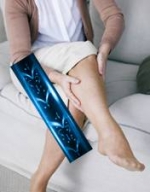Get Moving: Peripheral Arterial Disease Could Cost you a Leg
Medically Reviewed by Gabor A. Winkler, MD
Lack of blood flow in your leg can lead to amputation. Now is the time to take action to prevent this tragedy. The general condition of blocked arteries in the legs and arms is Peripheral Arterial Disease (PAD).
THE DANGER
Blood vessels in the leg can begin to close from a build up of cholesterol, calcium and fibers (the mixture is called “plaque”). Lack of oxygen and nutrition will cause the leg to deteriorate. This is the most severe type of PAD, known as Critical Limb Ischemia (CLI). The words “critical” and “limb” are pretty straightforward. “Ischemia” is a medical term for “lack of blood supply.”
Left untreated, the muscles and the skin of the leg will eventually not get enough oxygen to survive, potentially leading to gangrene. Amputation of the leg can result.
THE HOPE
“If treated quickly and correctly, most people can regain use of their legs and quality of life,” says McLeod Vascular Surgeon Gabor Winkler. “The challenge is that each case is quite complex with highly unique individual issues. The goal is always the same: improving the patient’s blood flow to the leg, reducing the pain and feeling of heaviness, and saving it from further deterioration.”
CLI TREATMENT OPTIONS
Lifestyle changes. Patients will be given help to stop smoking and encouragement to start walking at least 30-minutes, 3 times a week.
Medications. Most treatment plans include prescriptions to control high blood pressure, high cholesterol, reduce pain and – should the patient require it – treat their diabetes.
Minimally Invasive Intervention or Surgery. Patients, who don’t improve with the above treatments, or those patients who develop skin sores that won’t heal, are likely to face some procedure. Most of the procedures are similar to procedures designed to improve blood flow around the heart.
- Angioplasty/Stenting. A thin tube with a balloon on the end is inserted in the blocked artery. The balloon is inflated, pressing the blockages against the vessel wall, opening the artery. A stent (a hollow mesh or wire tube) may be inserted in the previously blocked area to ensure it stays open.
- Endarterectomy.In this case, the vascular surgeon cuts an opening into the artery. Then removes the plaque. This technique is more commonly used to open arteries in the groin or neck area. Its success also depends on the extent of blockage of the artery.
- Arterial Bypass Surgery. Extensive blockages often require the arterial bypass. Using a technique similar to a heart bypass, vascular surgeons take one of the patient’s veins from elsewhere or a tube of manmade material. They stitch it around the blockage, creating an alternate route for the blood.
FINAL THOUGHT.
Talented vascular specialists can even help patients who already have gangrene in their legs, possibly limiting amputation.
However, the earlier a patient sees a vascular specialist, the greater the chance of successful restoration of blood flow, elimination of pain and avoidance of amputation.
Sources include: McLeod Health, Centers for Disease Control & Prevention, National Institutes of Health, Circulation Foundation (UK), Vascular Disease Foundation, National Limb Loss Information Center, Society for Vascular Surgery
-
McLEOD REGIONAL MEDICAL CENTER FLORENCE
843-777-2000 -
McLEOD DARLINGTON
843-777-1100 -
McLEOD DILLON
843-774-4111 -
McLEOD LORIS
843-716-7000 -
McLEOD SEACOAST
843-390-8100 -
McLEOD CHERAW
843-537-7881 -
McLEOD CLARENDON
803-433-3000



-
McLEOD REGIONAL MEDICAL CENTER FLORENCE
843-777-2000 -
McLEOD DARLINGTON
843-777-1100 -
McLEOD DILLON
843-774-4111 -
McLEOD LORIS
843-716-7000 -
McLEOD SEACOAST
843-390-8100 -
McLEOD CHERAW
843-537-7881 -
McLEOD CLARENDON
803-433-3000
 Find a Doctor
Find a Doctor  Locations
Locations  Services
Services 